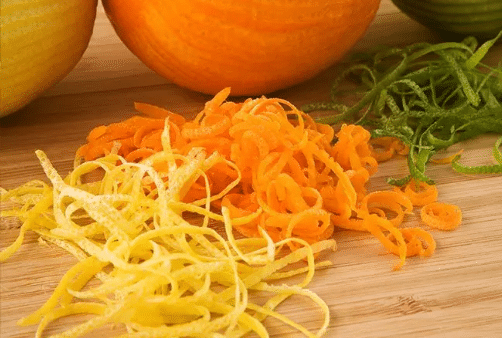Although the juice and pulp of lemon are widely used, lemon peels actually have a higher concentration of nutrients. Lemon peels are packed with vitamin C, pectin, calcium, potassium, fiber, alpha hydroxy acids, and flavonoids such as D-limonene.
Studies have shown that lemon peel contains bioactive compounds that have several health benefits.
Ladies, do you just squeeze the juice out of the lemon and throw it away? Well, the peel can also serve as a great ingredient with benefits. Learn about the potential health benefits of lemon peels and their uses in this article.
Lemon and Lemon Peels

The lemon (Citrus × limon) is a species of small evergreen tree in the flowering plant family Rutaceae, native to Asia, primarily Northeast India (Assam), Northern Myanmar, or China.
The tree’s ellipsoidal yellow fruit is used for culinary and non-culinary purposes throughout the world, primarily for its juice, which has both culinary and cleaning uses. The pulp and rind are also used in cooking and baking.
The juice of the lemon is about 5-6% citric acid, with a pH of around 2.2, giving it a sour taste. The distinctive sour taste of lemon juice, derived from citric acid, makes it a key ingredient in drinks and foods such as lemonade and lemon meringue pie.
Lemon is a versatile fruit. From its pulp to the peel – it is nutritive overall because it is rich in antioxidants and has a very high level of Vitamin C. In fact, dry lemon peel can be a great component for your skin, body nourishment, bakery, and drink, and can be a handy product in the house for cleansing and fragrance.
Ashish Rani, Clinical Dietitian, HCMCT Manipal Hospitals, tells HealthShots, “Vitamins, minerals, and fiber are found in lemon peel, and all of these have a variety of health benefits. The peel of a lemon, in fact, has more nutrients than the fruit or juice.”
What is the Nutritional Value of Lemon Peels?

| Table. Nutrients in 100 grams of lemon peel | |
|---|---|
| Nutrient | Amount |
| Water | 81.6 grams |
| Calories | 47 kcal |
| Protein | 1.5 grams |
| Fat | 0.3 grams |
| Carbohydrates | 16 grams |
| Fiber | 10.6 grams |
| Sugar | 4.17 grams |
| Calcium | 134 mg |
| Iron | 0.8 mg |
| Magnesium | 15 mg |
| Phosphorus | 12 mg |
| Potassium | 160 mg |
| Sodium | 6 mg |
| Zinc | 0.25 mg |
| Copper | 0.092 mg |
| Selenium | 0.7 mcg |
| Vitamin C | 129 mg |
| Thiamin | 0.06 mg |
| Riboflavin | 0.08 mg |
| Niacin | 0.4 mg |
| Pantothenic acid | 0.319 mg |
| Vitamin B6 | 0.172 mg |
| Folate | 13 mcg |
| Vitamin A | 50 IU |
| Vitamin E | 0.25 mg |
20 Benefits of Lemon Peels

1. Promotes heart health
Lemon peels are rich in vitamin C—about 31 mg, which accounts for 51% of your daily vitamin C needs. Studies have shown that consuming vitamin C-rich fruits and vegetables is associated with a lower risk of stroke and cardiovascular disease.[mfn]https://www.healthshots.com/healthy-eating/superfoods/health-benefits-of-lemon-peels-or-zest-and-how-to-store-it/[/mfn]\
Additionally, the fiber and plant chemicals in lemon peels such as hesperidin and diosmin can help lower blood cholesterol levels.
2. Loaded with antioxidants
Lemon peels are a great source of antioxidants including vitamin C and D-limonene, which help your body fight free radicals and cellular damage. Regular consumption of antioxidants such as D-limonene has been linked in studies to a decreased risk of type II diabetes and heart disease.
In addition, D-limonene aids in boosting the activity of an enzyme that counteracts oxidative stress, which is linked to tissue damage and accelerated aging.
3. Boosts immunity
It contains antioxidants such as D-limonene and vitamin C, which support your immune system and lower your disease risk. Lemon peels, like other citrus fruits, contain vitamin C, which can help your immune system stay healthy. If you’re starting to feel a little under the weather, adding lemon peel into your meals or even your tea might help give your body the boost it needs to get through.
4. Improves digestion
Lemon zest has long been used as a digestive aid. Lemon peel is high in pectin, a soluble fiber that helps prevent constipation and indigestion and promotes bile output.
5. May treat gallstones
Studies suggest that lemon peel may aid in the treatment of gallstones. D-limonene, a cholesterol solvent, dissolves the cholesterol in gallstones and may be an effective alternative to surgery.
6. Supports oral health
Lemon peels are high in citric acid, which helps to compensate for Vitamin C deficiency and aids in the treatment of common oral issues. Lemon peel has antibacterial properties that help prevent the growth of bacteria that can cause dental cavities and gum infections.
7. May treat bacterial and fungal infections
Anecdotal research suggests that consuming lemon peel tea can prevent the common cold, flu, ear infection, and urinary tract infections because lemon peel has antimicrobial qualities.
Lemon peel slows the growth of fungi and bacteria that are resistant to antibiotics. Despite these promising findings, however, more research is needed to make a strong conclusion.
8. May have anticancer properties
Due to its flavonoid content, including salvestrol Q40 and limonene, lemon peel has been connected to both cancer prevention and treatment. D-limonene has been shown in animal studies to increase the death rate of cancer cells and inhibit the growth of stomach cancer cells. However, lemon peels should not be considered a cancer cure.
9. Improves bone health
Lemon peel may promote bone health due to its high levels of calcium and vitamin C, both of which are necessary building blocks for the bones. In one animal study, ascorbic acid was shown to help treat osteoporosis.
Since lemon peel is rich in ascorbic acid, it may have the potential to prevent osteoporosis and other bone disorders, although additional research is needed.
10. Boosts skin health
Lemon peel has several properties that are beneficial for skin health. It acts as an exfoliant that can help remove dead skin cells and promote the growth of new skin cells. However, you should never apply lemon peel directly to the skin. Dilute with olive oil or other carrier oils and do a patch test before applying it over a large area.
11. Natural cleaning solution
Lemons are often used as natural cleaning products because of their antibacterial and antimicrobial properties. Combined with vinegar, lemon peel can be used to make a great all-purpose cleaner.
12. Weight loss
Lemon peels can be used in ample ways that can aid in weight loss. They are able to do so because they contain a substance called pectin. Pectin is a substance that aids in weight loss in the body.
13. Treats oxidative stress
Lemon peels are effective in reducing oxidative stress (the imbalance between free radicals and antioxidants in the body). Lemon peels have a high amount of citrus bioflavonoids, which is a very powerful agent for reducing Oxidative stress in the body.
14. Removes toxins from the body
The toxic elements present in the body can not only make the individual weak from the inside but can also increase the addiction or craving for hard drinks and other harmful foods.[mfn]https://en.wikipedia.org/wiki/Lemon[/mfn] Because of their citrus bioflavonoid elements, lemon peels can be helpful in eradicating toxic elements present in the body naturally.
15. Fridge deodorizer
Put a few lemon peels in your fridge to absorb the odor. This will prevent a smelly odor inside your fridge and keep it fresh.[mfn]https://www.medicinenet.com/benefits_and_uses_of_lemon_peel/article.htm[/mfn]
16. Stainless-steel cleaner
Put a tablespoon of salt on your stainless steel item (which you want to clean) and scrub it using lemon peels to remove stains. Make sure to not do it over a minute or two and rinse thoroughly after doing so.
17. Kettle cleaner
Fill the kettle with water and add lemon peels to it. Boil the water in it to remove any remnants or mineral deposits. Let the water sit for about an hour and then rinse it with normal water.
18. Body scrub
Lemon peels can be used as an effective and natural body scrub. To use it, chop lemon peel and mix sugar, and olive oil to it. Massage the mixture gently on wet skin. Rinse well after you’re done.
19. Face mask
Add lemon peel powder to the rice flour and cold milk and apply it on the face for an exfoliating and cleansing face mask.
20. Other health benefits
Lemon peels have various other health benefits including cleansing the liver, strengthening the blood capillaries, treating ear infections, improving blood circulation, reducing muscle contractions, and preventing strokes.
Want to know more, you can watch the video below:
Do Lemon Peels Have Side Effects?
Lemon peel has no known side effects and is considered safe according to the FDA. Animal studies have linked large amounts of D-limonene to carcinogenic effects. However, humans do not have the protein that is involved in this process, so the finding is irrelevant to humans.
Before using lemon peel, scrub the fruit or wash it with baking soda to remove any pesticide residue. Additionally, it is important to speak with your doctor before you begin to drink lemon peel water if you have a history of health issues such as stomach ulcers.
Making Lemon Zest and Storing Them

Lemon peel is organic, and it needs proper storage methods. Rani suggests the ways you can store lemon peel. She explains how you can prepare a dry lemon peel at home:
- You can zest or peel the lemons
- You can store the lemon zest in a deep freeze with a zip-top plastic bag or you can dry store it.
- Or you can dry the peels in the oven or on the counter
After preparing the zest, you can use it in numerous ways in your daily routine. Here are 8 uses of lemons suggested by Rani:
- Prepare lemon tea and many other drinks like mojitos.
- Use it in bakery items for decoration or bake a lemon cake.
- Prepare pancakes.
- Use in gravies to give a tangy punch.
- Add in soups, or prepare a soup for citric flavor.
- Fridge deodorizer. Scoop out the lemon from the peel and add some salt to it.
- You can put this in any corner so as to make your fridge feel fresh.
- Prepare face packs for glowing skin.
- Store as a pickle
Our Thoughts on This
When life gives you lemons, don’t just squeeze them and throw away the peel! Make the most of the lemon peel too for your health’s sake! Because there are many benefits of lemon peels.
We all are well aware of the numerous health benefits and usage of lemon, which makes a key ingredient in our kitchen and refrigerator. That refreshing glass of lemonade and a plate of freshly cut salad is all but incomplete without a tinge of lemon. It is a taste enhancer with high nutritional value.
And while lemon can be used in endless forms, its peel often finds its way to the dustbin. Ladies, think before you discard this wonder food!

